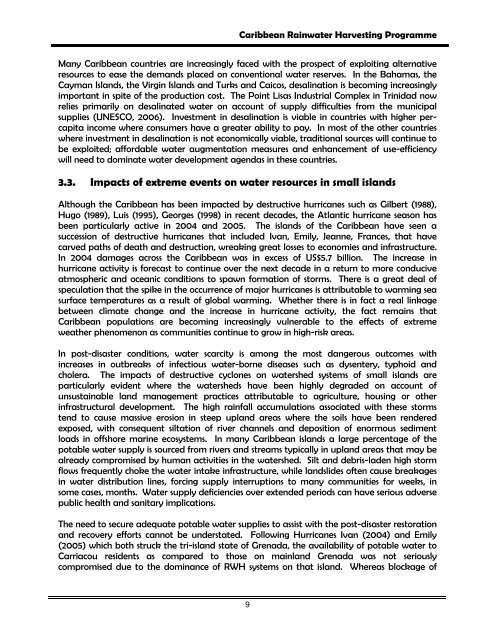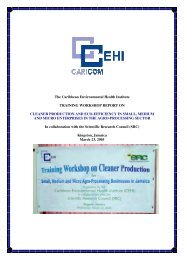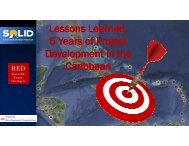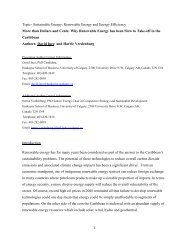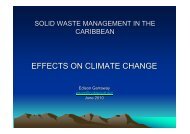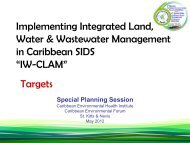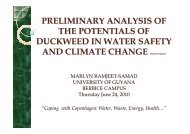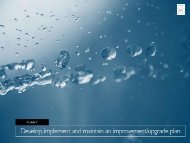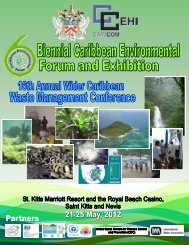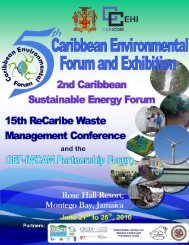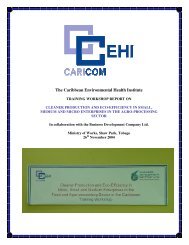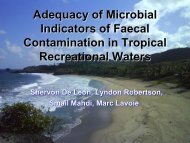A programme for Promoting Rainwater Harvesting in the Caribbean
A programme for Promoting Rainwater Harvesting in the Caribbean
A programme for Promoting Rainwater Harvesting in the Caribbean
Create successful ePaper yourself
Turn your PDF publications into a flip-book with our unique Google optimized e-Paper software.
<strong>Caribbean</strong> <strong>Ra<strong>in</strong>water</strong> <strong>Harvest<strong>in</strong>g</strong> ProgrammeMany <strong>Caribbean</strong> countries are <strong>in</strong>creas<strong>in</strong>gly faced with <strong>the</strong> prospect of exploit<strong>in</strong>g alternativeresources to ease <strong>the</strong> demands placed on conventional water reserves. In <strong>the</strong> Bahamas, <strong>the</strong>Cayman Islands, <strong>the</strong> Virg<strong>in</strong> Islands and Turks and Caicos, desal<strong>in</strong>ation is becom<strong>in</strong>g <strong>in</strong>creas<strong>in</strong>glyimportant <strong>in</strong> spite of <strong>the</strong> production cost. The Po<strong>in</strong>t Lisas Industrial Complex <strong>in</strong> Tr<strong>in</strong>idad nowrelies primarily on desal<strong>in</strong>ated water on account of supply difficulties from <strong>the</strong> municipalsupplies (UNESCO, 2006). Investment <strong>in</strong> desal<strong>in</strong>ation is viable <strong>in</strong> countries with higher percapita<strong>in</strong>come where consumers have a greater ability to pay. In most of <strong>the</strong> o<strong>the</strong>r countrieswhere <strong>in</strong>vestment <strong>in</strong> desal<strong>in</strong>ation is not economically viable, traditional sources will cont<strong>in</strong>ue tobe exploited; af<strong>for</strong>dable water augmentation measures and enhancement of use-efficiencywill need to dom<strong>in</strong>ate water development agendas <strong>in</strong> <strong>the</strong>se countries.3.3. Impacts of extreme events on water resources <strong>in</strong> small islandsAlthough <strong>the</strong> <strong>Caribbean</strong> has been impacted by destructive hurricanes such as Gilbert (1988),Hugo (1989), Luis (1995), Georges (1998) <strong>in</strong> recent decades, <strong>the</strong> Atlantic hurricane season hasbeen particularly active <strong>in</strong> 2004 and 2005. The islands of <strong>the</strong> <strong>Caribbean</strong> have seen asuccession of destructive hurricanes that <strong>in</strong>cluded Ivan, Emily, Jeanne, Frances, that havecarved paths of death and destruction, wreak<strong>in</strong>g great losses to economies and <strong>in</strong>frastructure.In 2004 damages across <strong>the</strong> <strong>Caribbean</strong> was <strong>in</strong> excess of US$5.7 billion. The <strong>in</strong>crease <strong>in</strong>hurricane activity is <strong>for</strong>ecast to cont<strong>in</strong>ue over <strong>the</strong> next decade <strong>in</strong> a return to more conduciveatmospheric and oceanic conditions to spawn <strong>for</strong>mation of storms. There is a great deal ofspeculation that <strong>the</strong> spike <strong>in</strong> <strong>the</strong> occurrence of major hurricanes is attributable to warm<strong>in</strong>g seasurface temperatures as a result of global warm<strong>in</strong>g. Whe<strong>the</strong>r <strong>the</strong>re is <strong>in</strong> fact a real l<strong>in</strong>kagebetween climate change and <strong>the</strong> <strong>in</strong>crease <strong>in</strong> hurricane activity, <strong>the</strong> fact rema<strong>in</strong>s that<strong>Caribbean</strong> populations are becom<strong>in</strong>g <strong>in</strong>creas<strong>in</strong>gly vulnerable to <strong>the</strong> effects of extremewea<strong>the</strong>r phenomenon as communities cont<strong>in</strong>ue to grow <strong>in</strong> high-risk areas.In post-disaster conditions, water scarcity is among <strong>the</strong> most dangerous outcomes with<strong>in</strong>creases <strong>in</strong> outbreaks of <strong>in</strong>fectious water-borne diseases such as dysentery, typhoid andcholera. The impacts of destructive cyclones on watershed systems of small islands areparticularly evident where <strong>the</strong> watersheds have been highly degraded on account ofunsusta<strong>in</strong>able land management practices attributable to agriculture, hous<strong>in</strong>g or o<strong>the</strong>r<strong>in</strong>frastructural development. The high ra<strong>in</strong>fall accumulations associated with <strong>the</strong>se stormstend to cause massive erosion <strong>in</strong> steep upland areas where <strong>the</strong> soils have been renderedexposed, with consequent siltation of river channels and deposition of enormous sedimentloads <strong>in</strong> offshore mar<strong>in</strong>e ecosystems. In many <strong>Caribbean</strong> islands a large percentage of <strong>the</strong>potable water supply is sourced from rivers and streams typically <strong>in</strong> upland areas that may bealready compromised by human activities <strong>in</strong> <strong>the</strong> watershed. Silt and debris-laden high stormflows frequently choke <strong>the</strong> water <strong>in</strong>take <strong>in</strong>frastructure, while landslides often cause breakages<strong>in</strong> water distribution l<strong>in</strong>es, <strong>for</strong>c<strong>in</strong>g supply <strong>in</strong>terruptions to many communities <strong>for</strong> weeks, <strong>in</strong>some cases, months. Water supply deficiencies over extended periods can have serious adversepublic health and sanitary implications.The need to secure adequate potable water supplies to assist with <strong>the</strong> post-disaster restorationand recovery ef<strong>for</strong>ts cannot be understated. Follow<strong>in</strong>g Hurricanes Ivan (2004) and Emily(2005) which both struck <strong>the</strong> tri-island state of Grenada, <strong>the</strong> availability of potable water toCarriacou residents as compared to those on ma<strong>in</strong>land Grenada was not seriouslycompromised due to <strong>the</strong> dom<strong>in</strong>ance of RWH systems on that island. Whereas blockage of9


